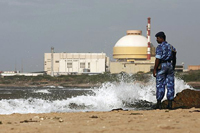Kudankulam 3 and 4 costs would double if new law applied

India wanted to bring the proposed units 3 and 4 to be constructed at Kudankulam Nuclear Power Plant. Source: RIA Novosti / Pavel Lisitsyn
The Indian government has been told that the costs for the Kudankulam Nuclear Power Plant’s planned third and fourth reactors would double as a consequence of the reactors coming under India’s new civil nuclear liability law, the Indian Express said on Thursday.
The paper citing Indian government sources said that Moscow conveyed the “steep cost escalation” over the past few weeks through technical experts and diplomatic channels, after “monetizing” the factors arising out of suppliers’ responsibility.
In November, Russia’s Ambassador to India, Alexander Kadakin said talks were on to address the issue over the reactors coming under the new law. “Hopefully stage three and four of Kudankulam will be settled because very active negotiations are taking place now,” the ambassador said last month. India’s insistence to apply its new civil nuclear liability law to these reactors has been to Russia’s chagrin. “We are not afraid of ‘liability,’ but at the same time, it is not fair when the Indian side has asked for the same terms of credit, which was used in constructing the first two reactors...and you plant liability on us,” Kadakin had said.
The Indian Express report said that negotiations were underway but no final understanding on the price is expected to be reached before Putin’s December 24 India visit. A government official told paper, “If the initial price was X, then the new cost is about 2X.”
The vexed problem with the third and fourth reactors cropped up as result of the approval by the Indian Parliament of the Civil Liability for Nuclear Damage Act in 2010, which allows the nuclear operator the right to demand compensation from a supplier in case faulty equipment causes an accident at a nuclear power plant.
India wanted to bring the proposed units 3 and 4 to be constructed at Kudankulam Nuclear Power Plant (KNPP), under the purview of the civil nuclear liability law. But Russia objected to the application of the civil nuclear liability law to these units, demanding that the same terms and conditions of KNPP’s units 1 and 2 should also be applied to units 3 and 4. India chose not to apply the civil nuclear liability law to units 1 and 2, arguing that they were constructed under an original 1988 agreement - long before the 2010 Civil Liability for Nuclear Damage Act. The bilateral agreement on KNPP’s units 1 and 2 puts the onus of any liability on the operator and there is no provision in it for recourse to suppliers.
While India’s Department of Atomic Energy and the Nuclear Power Corporation of India had agreed with the Russians and backed the proposal, the Indian Prime Minister’s Office sought legal consideration. Finally it was decided that the 2010 law would apply to all nuclear plants in India and Russia wasn’t given an exemption despite the agreement for units 3 and 4 preceding the new law. Analysts have said that the Indian Prime Minister’s Office is wary of similar demands from French and American suppliers.
All rights reserved by Rossiyskaya Gazeta.
Subscribe
to our newsletter!
Get the week's best stories straight to your inbox

